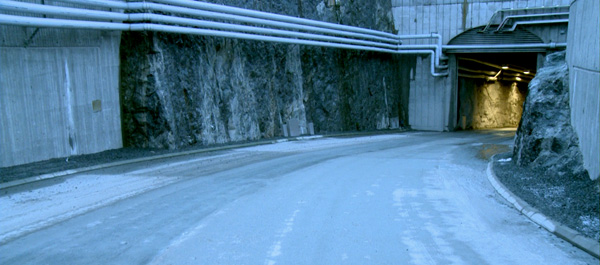|
Reviews of Recent Independent, Foreign, & Documentary Films in Theaters and DVD/Home Video

INTO ETERNITY What might have been a dryly informative documentary about nuclear waste disposal has been made into nothing short of a work of art. Danish conceptual artist Michael Madsen stitches the film together out of mesmerizing, slowed-down sequences, brought to life by a soundtrack of symphonies, psytrance, and silences palpable enough to feel like a score. Into Eternity meditates on Onkalo (or “hiding place”), a five-kilometer deep storage facility for nuclear waste under construction in the northern Finnish bedrock. It is slated for completion over a century from now and intended to last for 100,000 years. This is beyond the pale of an environmental issue. The timescale and philosophical considerations inherent to the project are dizzying. Intended as a permanent solution to storing nuclear waste in “unstable conditions above ground,” the visionaries of Onkalo are quite literality bracing against the apocalypse. Nuclear waste now kept in cool water vats (which buffer the radiation) requires funds, electricity, and constant maintenance by highly skilled technicians—any of which could be disrupted by a catastrophic war, a natural disaster, or the Ice Age that’s expected 60,000 years from now. If anything or anyone survives, they will, in theory, need to be protected from the hidden, inaccessible waste, the dangers of which they may no longer understand. Madsen speaks directly to these future generations in the dark caverns of this expanding underground city, lit for the duration of his on-camera monologues by a burning match. This whimsical conceit is fitting as Onkalo is not for us but for the next 3,000 generations. The question of how to prevent the site from being compromised necessitates conjecture about earth dwellers 100,000 years from now, yet here it is discussed in the most pragmatic terms by Scandinavian scientists and politicians. Do we leave a marker at the site or nothing at all in the hopes that it will be forgotten? If we leave a marker, should it be in the form of a written language? Or an image (Munch’s The Scream has been suggested)? Or through the landscape (perhaps littering the terrain above Onkalo with terrifying metal thorns)? Or do we expect that a civilization sophisticated enough to drill so deep into the ground would understand the meaning and danger of radiation? The more
practical questions—like whether or not nuclear energy is the right
solution for our civilization—bubble up to the surface toward the
end of the film but are dwarfed by its artistic grandeur and then
forgotten. Into Eternity is more visually and conceptually
beautiful than it is urgent. There is a sense that the
panel of experts mulling over these issues in the interspersed
interviews have been coached to speak in hypnotic tones. Elegant visual
details (like a signature below the speaker’s name) and sci-fi style
graphics elevate the conversation beyond documentary to art-house video
installation. Figures fade in and out, and the viewer is often plunged
into long sequences without narration in the bowels of Onkalo’s
corridors. Here, I had the impression that we were left alone to ponder.
Yana Litovsky
|

